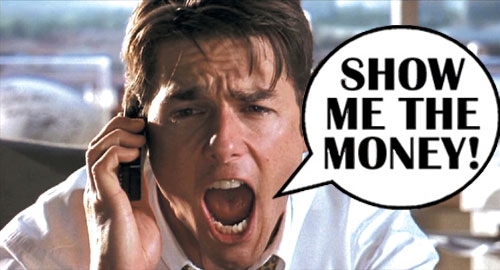If you want to pay off your credit card debt, but do not earn enough from your day job, starting a home-based business might be the answer. You can turn a hobby into a lucrative business, and all income from your business can go towards your consumer debt. I’m constantly advocating a side hustle or a Plan B just for this purpose. Of course, this is easier said than done, as it can take several months to get a new business off the ground. And even if you do get your business off the ground and acquire several clients, you may run into a few slow payers.
Getting some clients to pay for services rendered can be challenging. But there are professional and effective ways to get your money.
1. Send a gentle reminder.
If you send a client an invoice, and the client’s payment is more than seven days past due, send a reminder email. In all likelihood, the client got busy and simply forgot about your payment. The email does not have to be lengthy, just a simple reminder statement, and you can perhaps attach or include the original invoice within the email. This gentle reminder is typically enough to prompt a payment.
2. Give the client a buzz.
In a perfect world, every client pays on time. But unfortunately, this is not always the case. And sometimes, a difficult client may ignore your payment reminder. Do not give up in your efforts. You completed the work and you deserve payment.
If you have the client’s telephone number, give a courtesy call reminding the client of the past due balance. There is always a chance that the client did not receive your previous email or invoice. Do not follow up immediately after your first reminder, allow 48 to 72 hours.
During this call, offer to assist your client. Maybe the client has every intention of paying your invoice, but he is experiencing short-term cash flow issues. This is understandable. Perhaps you can set up a payment date in the future, or split the payment over several weeks or months. Thus, you receive what’s owed, plus maintain a good relationship with the client.
3. Get professional help
Despite your best efforts to handle the situation professionally, a client may demonstrate by his actions that he has no intentions of paying you. You have two choices: either let the issue go and take a loss on the project, or use Cavalry Portfolio Services to create a debt resolution plan.
These types of services are excellent for both resolving small business debts and collecting from delinquent vendors. Understand, however, that most debt recovery companies charge a fee for their services. This might be a flat fee, or a percentage of the debt recovered. Know the facts and fee structure before going this route.
Do not let fear of being stiffed stop you from going into business. Even the most successful companies deal with a few bad clients from time-to-time. To protect yourself, make sure you have a written contract between you and the client. Additionally, keep accurate records of each project you work on.

